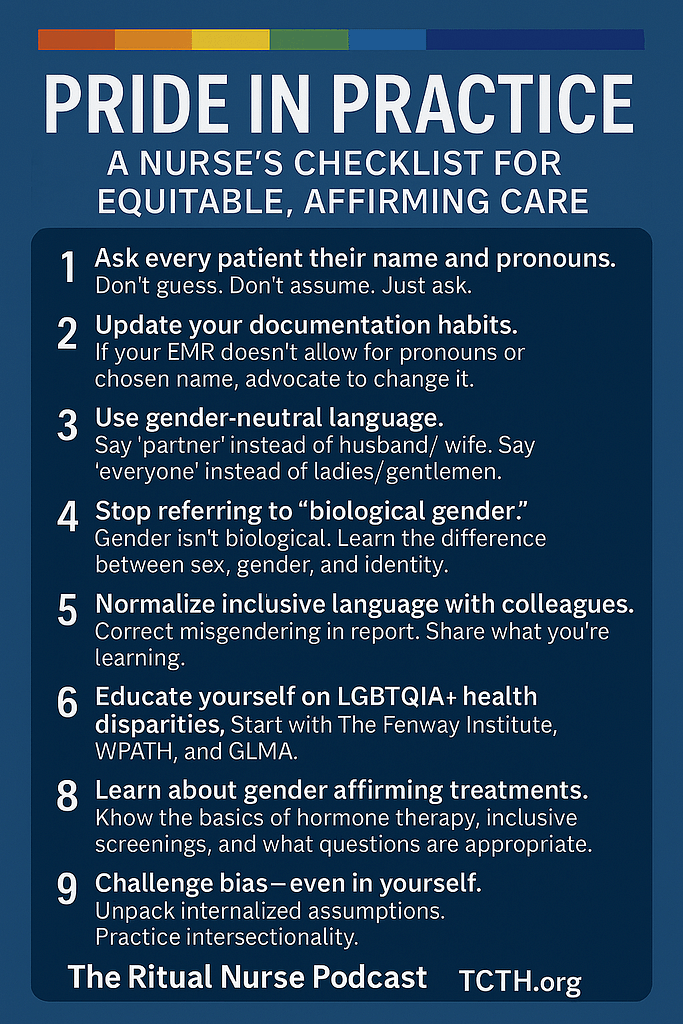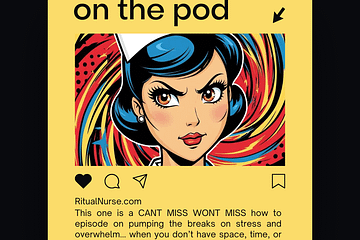Pride in Practice: EQUITY and Equality means affirming care for every patient
Pride Month presents a perfect opportunity for healthcare professionals to examine how we provide care to LGBTQIA+ patients, particularly those who identify as transgender or non-binary. As nurses, we’re bound by ethical codes and professional standards that transcend our personal beliefs—something that the latest episode of The Ritual Nurse podcast explores with both compassion and clarity.
The episode begins by distinguishing between equality and equity in healthcare settings. While equality ensures everyone can access the same resources (like walking through the hospital door), equity guarantees that patients receive care tailored to their specific needs. This distinction becomes particularly crucial when caring for marginalized populations who face systemic barriers and discrimination within healthcare systems. According to the American Nurses Association Code of Ethics, nurses are professionally obligated to collaborate for human rights and the reduction of health disparities—this isn’t optional or political; it’s a fundamental professional requirement.
Understanding our implicit biases forms another cornerstone of providing equitable care. These unconscious prejudices, shaped by our upbringing and societal conditioning, color our perceptions before we’ve even had a chance to examine them. For nurses, recognizing these biases becomes especially important given the inherent power dynamics in healthcare. Patients come to us in vulnerable states, trusting us with their well-being. This power imbalance creates an enhanced ethical responsibility to do no harm—regardless of whether a patient’s identity aligns with our personal beliefs or understanding of the world.
The podcast delves deeply into transgender care basics, beginning with essential terminology. Biological sex refers to physical characteristics (chromosomes, anatomy, etc.), while gender represents one’s social and psychological identity—how someone understands themselves and moves through the world. Cisgender means your gender identity matches your birth sex, while transgender indicates a mismatch between the two. Importantly, transitioning—the process someone goes through to align their external presentation with their internal gender identity—varies widely between individuals and may include social changes (name, pronouns, presentation) and/or medical interventions (hormones, surgeries).
One of the most impactful segments addresses practical clinical pearls for affirming care. Simple actions like asking every patient what name and pronouns they prefer, using neutral language when uncertain, understanding hormone therapy basics, and recognizing potential dysphoria triggers can dramatically improve care quality. The podcast emphasizes that these practices aren’t “extra” or optional—they represent ethical, professional, and essential nursing care that reduces harm and improves health outcomes.
The episode confronts the tension between personal beliefs and professional obligations head-on. While nurses have every right to their personal and religious beliefs, these cannot justify biased care. The Joint Commission explicitly states that discrimination based on gender identity or sexual orientation violates patient rights. As the podcast bluntly puts it: “If your belief system includes denying care, respect, or dignity to any patients, you are in the wrong profession.”
For healthcare professionals seeking to provide more affirming care, education represents the first step toward change. Understanding terminology, recognizing our biases, and implementing simple clinical practices can significantly impact patient experiences. Resources exist to help nurses navigate these conversations and care situations with confidence and compassion. Most importantly, acknowledging that affirming care isn’t political—it’s evidence-based practice that improves health outcomes—can help bridge divides in professional settings.
The healthcare disparities facing LGBTQIA+ patients remain stark. Nearly one-third of transgender individuals delay or avoid medical care due to previous discrimination or fear of mistreatment. As the first point of contact in many care settings, nurses hold tremendous power to either perpetuate trauma or create safe, affirming environments. The podcast reminds listeners that every queer and transgender patient belongs in healthcare spaces and deserves dignified, respectful treatment—not just during Pride Month, but every day of the year.
Clinical Pearls Infographic



